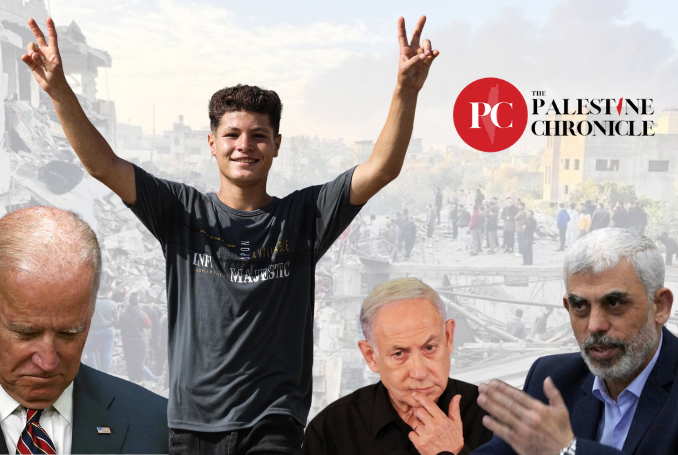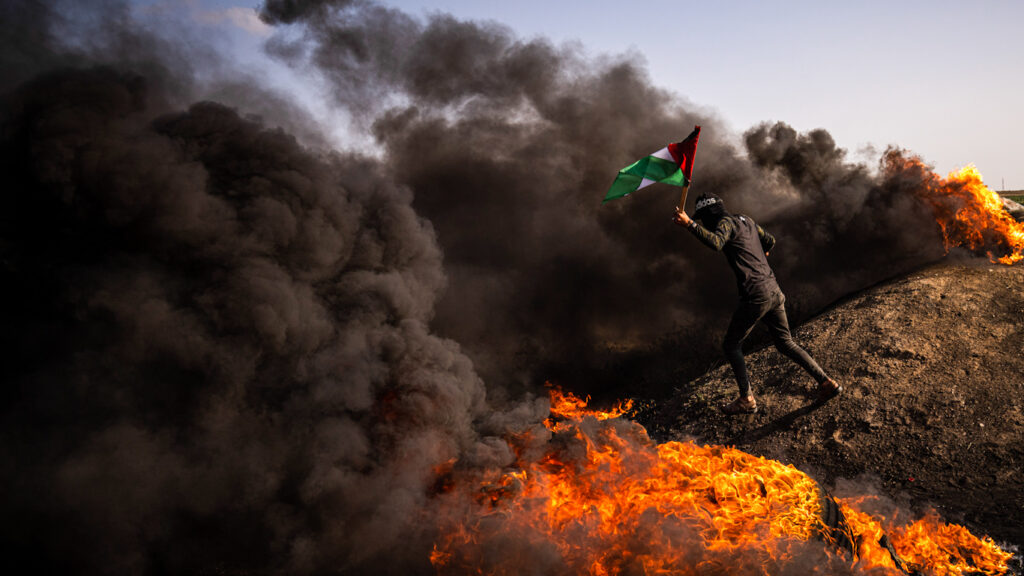‘In a Roaring Flood’: How Israel Provoked October 7 Attacks, Yet Was Caught by Surprise
PALESTINE ISRAEL GAZA GENOCIDE, 1 Jan 2024
Ramzy Baroud | Politics for the People – TRANSCEND Media Service
The Spark That Lit the Fire: The Untold Story
28 Dec 2023 – The dramatic, earth-shattering events in Palestine starting on October 7 have taken many people by surprise. However, attentive observers are not.
Few expected that Palestinian fighters would be parachuting into southern Israel on October 7; that instead of capturing a single Israeli soldier – as done in 2006 – hundreds of Israelis, including many soldiers and civilians, would find themselves captive in besieged Gaza.
The reason behind the ‘surprise’, however, is the same reason that Israel is still reeling under collective shock, which is the tendency to pay close attention to political discourses and intelligence analyses of Israel and its supporters – while largely neglecting the Palestinian discourse.
For better comprehension, let us go back to the start.
The Spark
We entered 2023 with some depressing data and dark predictions about what was awaiting Palestinians in the new year.
Just before the year commenced, the United Nations Mideast envoy Tor Wennesland, said that 2022 was the most violent year since 2005. “Too many people, overwhelmingly Palestinian, have been killed and injured,” Wennesland told the UN Security Council.
This figure – 171 killed and hundreds wounded in the West Bank alone – did not receive much coverage in Western media. The mounting Palestinian victims, however, registered among Palestinians and their Resistance movements.
As anger and calls for revenge grew among ordinary Palestinians, their leadership continued to play its same traditional role – of pacifying Palestinian calls for resistance, while continuing with its ‘security coordination’ with Israel.
Palestinian Authority President Mahmoud Abbas, 88, carried on rehashing the old language about a two-state solution and the ‘peace process’, while cracking down on Palestinians who dared protest his ineffectual leadership.
Defenseless in the face of a far-right Israeli government with an open agenda to crush Palestinians, to expand illegal settlements and to prevent the establishment of a Palestinian state, Palestinians were forced to develop their own defensive strategies.
The Lions’ Den – a multi-factional Resistance group which first appeared in the city of Nablus in August 2022 – grew in power and appeal. Other groups, old and new, emerged on the scene throughout the northern West Bank, with the single objective of uniting Palestinians around a non-factional agenda and, ultimately, producing a new Palestinian leadership in the West Bank.
These developments sounded alarm bells in Israel. The Israeli occupation army moved quickly to crush the new armed rebellion, raiding Palestinian towns and refugee camps one after the other, with the hope of turning this nascent revolution into another failed attempt to challenge the status quo in occupied Palestine.
The bloodiest of the Israeli incursions occurred in Nablus on February 23, Jericho on August 15 and, most importantly, in the Jenin refugee camp.
The July 3 Israeli invasion of Jenin was reminiscent, in terms of casualties and degree of destruction, to the Israeli invasion of that very camp in April 2002.
The outcome, however, was not the same. Back then, Israel had invaded Jenin, along with other Palestinian towns and refugee camps, and succeeded in crushing armed resistance for years to come.
This time around, the Israeli invasion merely ignited a wider rebellion in the Occupied Palestinian Territories, creating a further schism in the already deteriorating relationship between Palestinians, on the one hand, and Abbas and his PA, on the other.
Indeed, just days after Israel concluded its attack on the camp, Abbas emerged with thousands of his soldiers to warn the bereaved refugees that “the hand that will break the unity of the people .. will be cut off from its arm”.
Yet, as the popular rebellion continued to build momentum in the West Bank, Israeli intelligence reports started talking about a plan composed by the deputy head of Hamas’ political bureau, Saleh Arouri, to ignite an armed Intifada.
The solution, according to the Israeli newspaper, Yedioth Ahronoth, citing official Israeli sources, was to kill Arouri.
Indeed, Israel’s attention and counterstrategy was focused intently on the West Bank, as Hamas, in Gaza at the time, in Israel’s viewpoint, seemed disinterested in an all-out confrontation.
But why did Israel reach such a conclusion?
Miscalculation
Several major events, the kind that would have pushed Hamas to retaliate, have taken place without any serious armed response by the Resistance in Gaza.
Last December, Israel had sworn in its most right-wing government in history. Far-right ministers Itamar Ben-Gvir and Bezalel Smotrich arrived on the political scene with the declared objectives of annexing the West Bank, imposing military control over Al-Aqsa Mosque and other Palestinian Muslim and Christian holy sites and, in the case of Smotrich, denying the very existence of the Palestinian people.
Their pledges were quickly translated into action under the leadership of Israeli Prime Minister Benjamin Netanyahu. Ben-Gvir was keen on sending a message to his constituency that the seizure of Al-Aqsa Mosque by Israel had become imminent.
He repeatedly raided or ordered raids on Al-Aqsa at an unprecedented frequency. The most violent and humiliating of these raids occurred on April 4, when worshippers were beaten up by soldiers while praying inside the mosque during the holy month of Ramadan.
Resistance groups in Gaza threatened retaliation. In fact, several rockets were fired from Gaza toward Israel, merely serving as a symbolic reminder that Palestinians are united, regardless of where they are in the geographic map of historic Palestine.
Israel, however, ignored the message, and used the Palestinian threats of retaliation, and the occasional ‘lone-wolf attacks’ – like that of Muhannad al-Mazaraa at the illegal Maale Adumim settlement – as political capital to ignite the religious fervor of Israeli society.
Not even the death of Palestinian political prisoner, Khader Adnan, on May 2 seemed to have shifted Hamas’ position. Some even suggested that there is a rift between Hamas and the Palestinian Islamic Jihad following Adnan’s death as a result of hunger strike in the Ramleh Prison.
On the same day, the PIJ fired rockets into Israel, as Adnan was one of its most prominent members. Israel answered by attacking hundreds of targets inside Gaza, mostly civilian homes and infrastructure, which resulted in the death of 33 Palestinians and the wounding of 147 more.
A truce was declared on May 13, again with no direct Hamas participation, giving further reassurance to Israel that its bloody onslaught on the Strip had achieved more than a military purpose – often referred to as ‘mowing the lawn’ – but a political one, as well.
Israel’s strategic estimation, however, proved to be wrong, as attested by Hamas’ well-coordinated October 7 attacks in southern Israel, targeting numerous military bases, settlements and other strategic positions.
But was Hamas being deceptive? Hiding its actual strategic objectives in anticipation of that major event?
‘Roaring Flood’
A quick examination of Hamas’ recent statements and political discourse demonstrate that the Palestinian group was hardly secretive about its future action.
Two weeks before 2023 commenced, at a Gaza rally on December 14, Hamas leader in Gaza, Yahya Sinwar, had a message for Israel: “We will come to you in a roaring flood. We will come to you with endless rockets; we will come to you in a limitless flood of soldiers … like the repeating tide.”
The immediate response to the Hamas’ attack was the predictable US-Western solidarity with Israel, calls for revenge, the complete destruction and annihilation of Gaza and the revitalized plans of displacing Palestinians out of Gaza into Egypt – in fact, out of the West Bank as well, into Jordan.
The Israeli war on the Strip, also starting on October 7, has resulted in unprecedented casualties compared to all Israeli wars on Gaza, in fact, on Palestinians during any time in modern history.
Quickly, the term ‘genocide’ was being used, initially by intellectuals and activists, and eventually by international law experts.
“Israel’s genocidal assault on Gaza is quite explicit, open, and unashamed,” associate professor of Holocaust and Genocide Studies at Stockton University, Raz Segal, wrote on October 13 in an article entitled ‘A Textbook Case of Genocide’.
Despite this, the UN could do nothing. Secretary-General Antonio Guterres said on November 8 that the UN has “neither money nor power” to prevent a potential genocide on Gaza.
In essence, this effectively meant the disabling of the international legal and political systems, as every attempt by the Security Council to demand an immediate and permanent ceasefire has been blocked by the US and Israel’s other Western allies.
As the death toll mounted among a starving population in Gaza – all food deprived per the November 28 estimation of the World Food Program – Palestinians resisted throughout the Gaza Strip.
Their resistance was not only confined to attacking or ambushing invading Israeli soldiers but was, in fact, predicated on a legendary steadfastness of a population that refused to be weakened or displaced.
Sumud
This sumud continued, even when Israel began to systematically attack hospitals, schools and every place that, in times of war, are seen as ‘safe places’ for a beleaguered civilian population.
Indeed, on December 3, UN Human Rights Chief, Volker Türk, said that “there is no safe place in Gaza”. This phrase was repeated often by other UN officials, along with other phrases such as “Gaza has become a graveyard for children” as first noted by UNICEF Spokesperson James Elder on October 31. This left Guterres with no other option but to, on December 6, invoke article 99, which allows the Secretary-General to “bring to the attention of the Security Council any matter which in his opinion may threaten the maintenance of international peace and security.”
Israeli violence and Palestinian sumud also extended to the West Bank as well. Aware of the potential for armed resistance in the West Bank, the Israeli army quickly launched major, deadly raids on countless Palestinian towns, villages and refugee camps, killing hundreds, injuring thousands and arresting thousands more.
But Gaza remained the epicenter of the Israeli genocide. Aside from a brief humanitarian truce from November 24 to December 1, coupled with few prisoner exchanges, the battle for Gaza – in fact, for the future of Palestine and the Palestinian people – continues, at an unparalleled price of death and destruction.
Palestinians know full well that the current fight will either mean a new Nakba, like the ethnic cleansing of 1948, or the beginning of the reversal of that very Nakba – as in the process of liberating the Palestinian people from the yoke of Israeli colonialism.
While Israel is determined to end Palestinian Resistance once and for all, it is obvious that the Palestinian people’s determination to win their freedom in coming years is far greater.
____________________________________________
 Dr. Ramzy Baroud is a journalist, author and editor of The Palestine Chronicle. His last book is The Last Earth: A Palestinian Story (Pluto Press, London) and his forthcoming book is These Chains Will Be Broken: Palestinian Stories of Struggle and Defiance in Israeli Prisons (Clarity Press, Atlanta). Baroud is a Non-resident Senior Research Fellow at the Center for Islam and Global Affairs (CIGA), Istanbul Zaim University (IZU). His website is www.ramzybaroud.net.
Dr. Ramzy Baroud is a journalist, author and editor of The Palestine Chronicle. His last book is The Last Earth: A Palestinian Story (Pluto Press, London) and his forthcoming book is These Chains Will Be Broken: Palestinian Stories of Struggle and Defiance in Israeli Prisons (Clarity Press, Atlanta). Baroud is a Non-resident Senior Research Fellow at the Center for Islam and Global Affairs (CIGA), Istanbul Zaim University (IZU). His website is www.ramzybaroud.net.
Go to Original – ramzybaroud.net
Tags: Collective Punishment, Ecocide, Ethnic Cleansing, Gaza, Genocide, Hamas, Inhuman Punishment, Israel, Israeli occupation, Massacre, Palestine, Warfare
JOIN THE BDS-BOYCOTT, DIVESTMENT, SANCTIONS CAMPAIGN TO PROTEST THE ISRAELI BARBARIC GENOCIDE OF PALESTINIANS IN GAZA.
DON'T BUY PRODUCTS WHOSE BARCODE STARTS WITH 729, WHICH INDICATES THAT IT IS PRODUCED IN ISRAEL. DO YOUR PART! MAKE A DIFFERENCE!
7 2 9: BOYCOTT FOR JUSTICE!
DISCLAIMER: The statements, views and opinions expressed in pieces republished here are solely those of the authors and do not necessarily represent those of TMS. In accordance with title 17 U.S.C. section 107, this material is distributed without profit to those who have expressed a prior interest in receiving the included information for research and educational purposes. TMS has no affiliation whatsoever with the originator of this article nor is TMS endorsed or sponsored by the originator. “GO TO ORIGINAL” links are provided as a convenience to our readers and allow for verification of authenticity. However, as originating pages are often updated by their originating host sites, the versions posted may not match the versions our readers view when clicking the “GO TO ORIGINAL” links. This site contains copyrighted material the use of which has not always been specifically authorized by the copyright owner. We are making such material available in our efforts to advance understanding of environmental, political, human rights, economic, democracy, scientific, and social justice issues, etc. We believe this constitutes a ‘fair use’ of any such copyrighted material as provided for in section 107 of the US Copyright Law. In accordance with Title 17 U.S.C. Section 107, the material on this site is distributed without profit to those who have expressed a prior interest in receiving the included information for research and educational purposes. For more information go to: http://www.law.cornell.edu/uscode/17/107.shtml. If you wish to use copyrighted material from this site for purposes of your own that go beyond ‘fair use’, you must obtain permission from the copyright owner.
Read more
Click here to go to the current weekly digest or pick another article:
PALESTINE ISRAEL GAZA GENOCIDE:

